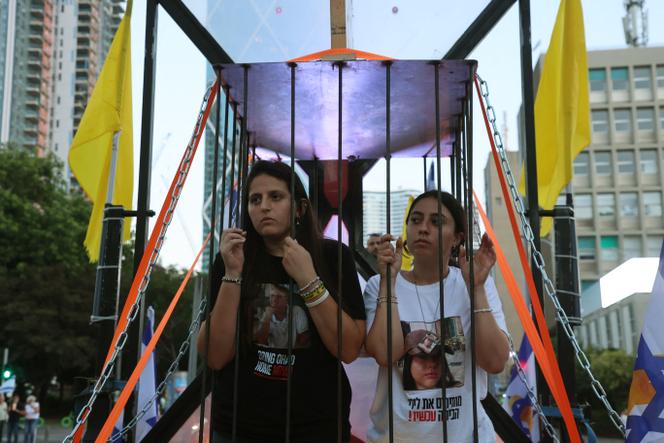


On most of the placards displayed a large photo of each hostage headed with their name. The age, specified in brackets, was crossed out and amended according to the day of their anniversary spent in captivity. On Thursday, August 1 several thousand people marched through the streets of Tel Aviv to mark the 300th day of captivity for the 115 people still being held by Hamas in the Gaza Strip. At the head of this procession in a cage set up on a float, Ella Ben-Ami, daughter of a hostage with a microphone in her hand, warned the crowd that the symbolic date marking one year of imprisonment is approaching. "The prime minister must sign an agreement!"
Some marched with a metal chain on their feet, which they trailed behind them on the asphalt. A way of continuing to attract attention after nine months of these weekly marches around the Kyria, the Israeli army headquarters, while fighting their "despair," said Merav Mor. Having previously come to mark the first 100 days, then the first 200 days of captivity, the niece of Abraham Munder, kidnapped from the kibbutz of Nir Oz, feels she has already tried everything: "I don't know what else might work to bring my uncle home."
During the demonstration, the recent targeted assassinations of Hamas political leader Ismail Haniyeh in Tehran, and of Fouad Shukur, a senior Hezbollah officer, in Beirut, and their effects on negotiations for the release of hostages are on everyone's lips. The last official talks between representatives of each side, held in Rome on Sunday, July 28, already seem way in the past. However, early on Thursday, Israeli President Isaac Herzog reassured everyone that it would be impossible to "claim victory" before all the hostages were returned.
The prime minister, Benjamin Netanyahu, was pictured with advisers at a meeting on the "hostage situation" in a photo released by the government communications service. Then in a press release, an Israeli official insisted on his "optimism" regarding negotiations with Hamas, confirming that they were still underway, despite the elimination of their political leader and chief negotiator.
In the procession along Tel Aviv's main thoroughfares, none of these public statements was enough to reassure the hostages' families. When 72-year-old Lee Siegel heard the news of the two assassinations in Beirut and Tehran, he immediately thought of his brother Keith, kidnapped from the Kfar Aza kibbutz. "How is this operation going to help him?" he wondered, worrying about potential Hamas "revenge" on the hostages. In his opinion, every time the prospect of an agreement becomes clearer, Israeli politicians refuse to compromise. In the government, where disagreements are increasing over the aftermath of the conflict, he believes the prime minister prefers to "cling to power" rather than "do his job" for the return of the hostages. Disappointed, the septuagenarian has been incensed since April when the release of the civilians was on the verge of becoming a reality before the addition of new Israeli demands scuppered the process.
You have 37.1% of this article left to read. The rest is for subscribers only.
